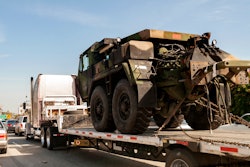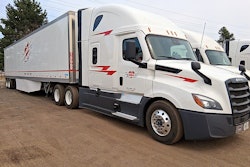As Congress rushed to wrap up as much business as possible before its month-long August recess, lawmakers were slow to move bills to ease the tax bite on truckers this summer, although they had a number of bills to choose from. None of the more than a half-dozen truck-related tax bills had moved out of committee as the recess approached.
Trucking-related tax bills sit idle
As Congress rushed to wrap up as much business as possible before its month-long August recess, lawmakers were slow to move bills to ease the tax bite on truckers this summer, although they had a number of bills to choose from. None of the more than a half-dozen truck-related tax bills had moved out of committee as the recess approached.
Meal allowance
At least four bills would boost the meals allowance for long-haul truck drivers to either 80 percent or 100 percent of the cost of a meal, compared to 60 percent now.
Sen. Christopher Bond, R-Mo., has a bill (S. 189) that would raise the allowance to 80 percent retroactive to this year. That bill, which has been languishing since January, is the only one that has special provisions for truck drivers and others covered by Department of Transportation hours-of-service rules.
Two bills (H.R. 1211, S. 831) – sponsored by Rep. Neil Abercrombie, D-Hawaii, and Sen. Richard Shelby, R-Ala. – would boost the rate to 100 percent quickly. Abercombie’s bill would take effect immediately, while Shelby’s bill would raise the deduction beginning in January.
Daniel Inoyue, D-Hawaii, is sponsoring a bill (S. 418) that would boost the percentage to 68 percent this year, 74 percent next year and 80 percent in 2003.
The allowance for all taxpayers was 100 percent until 1987, when it was cut to 80 percent as a result of President Reagan’s tax reform package. Congress further cut it to 50 percent in 1993. But in 1997, in recognition of the difference between so-called “three-martini lunches” and the modest meals eaten away from home by long-haul truck drivers, it carved out an exception for those under hours-of-service rules. That law phased the allowance back to 80 percent by 2008.
The meal deduction will rise to 65 percent for 2002 and 2003 and another 5 percentage points every two years.
Heavy-use tax rebate
Carriers that sell trucks would get something of a tax break under a proposal introduced by Sen. James Inhofe, R-Okla. The bill (S. 878) would give a pro-rata rebate of the annual heavy use tax to sellers of trucks that have driven at least 5,000 miles in the year of the sale. The buyer would have to pay a pro rata share of the tax base on the time the vehicle is used that year.
The tax, which ratchets up to $550 a year on tractor-trailers with a gross combined weight rating of 75,000 pounds, is now often paid twice – once by the sellers and once by the buyer -if the buyer cannot present the paperwork proving that the tax had been paid earlier.
Tire taxes
House and Senate bills dealing with the excise tax on heavy truck tires would simplify the tax calculation and represent a possible savings for carriers. The bills (S. 594, H.R. 901), introduced by Sen. Don Nickles, R-Okla., and Rep. Wes Watkins, R-Okla., would calculate the excise tax on tires on the load weight rating, rather than on the weight of the tire as at present.
While the tax is assessed on the tire manufacturer, the change could pass any savings on to carriers if they are able to buy less expensive tires with load ratings that are more closely tied to their needs, an American Trucking Associations tax specialist noted. Under the bills, the tax would be 8 cents per 10 pounds over 3,500 pounds load rating.
Nothing on excise tax
Any prospect for relief from the 12 percent federal excise tax on new truck sales looks to be at least a year away. There is little prospect for introduction of the bill this year, the ATA tax specialist suggests, because it would be caught up in the politics of highway funding. The receipts from the tax flow into the highway trust fund, and efforts to reduce the flow of money into the fund always meet resistance from highway construction and safety groups, as well as from state governments.
Trucking lobbyists are beginning to promote the idea of a cut in the truck excise tax and hope to get a bill introduced next year. Congress last tinkered with the excise tax in 1997. It eliminated the tax on the renovation of existing tractors when the remanufacturing work is less than 75 percent of the retail price of a comparable new vehicle. Congress also raised the exemption on new equipment installed within six months of the purchase of a new rig from $200 to $1,000.
Other aspects of the 1997 law weren’t as favorable to the industry, however. The law changed the tax treatment of new tires bought along with new vehicles by including the cost of the tires in the total vehicle price. Offsetting that somewhat was a provision giving truck dealers a credit on the taxes paid by the vehicle purchaser that could be passed on to the truck owner.










